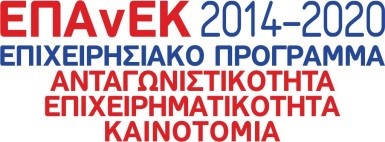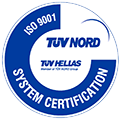Greece participates in the European Chips Joint Undertaking (JU), represented by the General Secretariat for Research and Innovation (GSRI). As the National Funding Body (NFB), GSRI supports the current call for proposals under the Non-Initiative (ECS) – 2025, with a budget of €6 million. This amount will be allocated to Greek entities whose proposals are approved for funding through the European evaluation and approval process conducted by the Chips JU bodies.
At present, the first stage of proposal submission (project outline level) is being completed. The deadline for the second stage, involving the submission of the full proposal, is 17 September 2025 (more detailed information available on the website:
https://www.chips-ju.europa.eu/CallsByCategory/?cname=920810001).
- Legal requirements for the eligibility of a partner or a project
- Type or nature of participants
GSRI potentially supports all private and public legal entities legally operating in Greece (not natural persons) namely:
- Research and knowledge-dissemination organizations (e.g. Higher-education Institutions or Research Centers/Institutes).
- Undertakings (a private and/or public sector unit, regardless of its legal status or size, engaged in economic activity).
- Other entities that will be considered as Research and knowledge-dissemination organizations, if respective requirements are met, or undertakings.
Besides natural persons, the following categories of undertakings are also not eligible:
- An “undertaking in difficulty” (according to art.2 of Reg. (EU) 651/2014[1]).
- An undertaking which is subject to an outstanding recovery order following a previous Commission decision declaring aid illegal and incompatible with the internal market.
- Legal, administrative and financial conditions
Eligible activities
- All funded activities must comply with the National RIS 3 (https://gsri.gov.gr/ethniki-stratigiki-exypnis-exeidikefsis-2021-2027/, https://www.espa.gr/el/Pages/RIS3.aspx ).
- In case of participants falling under category (b) the main part of the project should fall within the categories of industrial research or experimental development or feasibility studies (according to the provisions of art 25 of Reg. EU 651/2014[2]). For SMEs funding for innovation activities (art. 28 of Reg. EU 651/20142) may also be provided.
- Consortium configuration
No restrictions.
- Other conditions
All applications should be accompanied by all elements and relevant documents that allow the Greek authorities to assess the eligibility criteria, and particularly those with regard to Article 2 of GBER Regulation, 651/2014 for undertakings in difficulty and the size of undertakings/enterprises.
Companies (business partner in the project) must provide specific information on the possible industrial and commercial impact of the project to the country and in Europe and justify that they have the necessary means to exploit the project results.
Following the final approval of the list of beneficiaries by the CHIPS JU, a national call will be published by GSRI. At national level, only legal and financial eligibility check is conducted and not a full peer review.
- Eligibility of the costs and funding
- Eligibility of costs
- Double funding
- The project submitted for funding must neither have already benefited from public funding nor be redundant or overlap with projects or part of projects already funded.
- Co-funding source
- National Strategic Reference Framework -NSRF 2021-2027.
- National public funding rates
Public Research Institutes and Universities: the aid intensity can reach 100% for performing non-economic activities (less the contribution of the JU) in accordance with point 19, article 2.1.1 of the «Framework for State aid for research and development and innovation» (2014/C 198/01).
Private Sector: (a) 50% of the eligible costs for industrial research; (b) 25% of the eligible costs for experimental development; (c) 50% of the eligible costs for feasibility studies.
The aid intensities for industrial research and experimental development may be increased up to a maximum aid intensity of 80 % of the eligible costs in accordance with points (a) to (d), where points (b), (c) and (d) must not be combined with each other:
(a) by 10% points for medium-sized enterprises and by 20 percentage point for small enterprises;
(b) by 15% points if one of the following conditions is fulfilled:
(i) the project involves effective collaboration:
- between undertakings among which at least one is an SME, or is carried out in at least two Member States, or in a Member State and in a Contracting Party of the EEA Agreement, and no single undertaking bears more than 70 % of the eligible costs, or
- between an undertaking and one or more research and knowledge-dissemination organisations, where the latter bear at least 10 % of the eligible costs and have the right to publish their own research results;
(ii) the results of the project are widely disseminated through conferences, publication, open access repositories, or free or open source software;
(iii) the beneficiary commits to, on a timely basis, make available licences for research results of aided research and development projects, which are protected by intellectual property rights, at a market price and on non-exclusive and non-discriminatory basis for use by interested parties in the EEA;
(iv) the research and development project is carried out in an assisted region fulfilling the conditions of Article 107(3), point (a), of the Treaty;
(c) by 5% points if the research and development project is carried out in an assisted region fulfilling the conditions of Article 107(3), point (c), of the Treaty;
(d) by 25% points if the research and development project:
(i) has been selected by a Member State following an open call to form part of a project jointly designed by at least three Member States or contracting parties to the EEA Agreement; and
(ii) involves effective collaboration between undertakings in at least two Member States or contracting parties to the EEA Agreement when the beneficiary is a SME, or in at least three Member States or contracting parties to the EEA Agreement when the beneficiary is a large enterprise; and
(iii) if at least one the two following conditions is fulfilled:
- the results of the research and development project are widely disseminated in at least three Member States or contracting parties to the EEA Agreement through conferences, publication, open access repositories, or free or open-source software; or
- the beneficiary commits to, on a timely basis, make available licences for research results of aided research and development projects, which are protected by intellectual property rights, at a market price and on non-exclusive and non-discriminatory basis for use by interested parties in the EEA.”
The aid intensity for feasibility studies may be increased by 10% points for medium-sized enterprises and by 20% points for small enterprises.
Maximum aid intensity for undertakings is calculated according to paragraphs 5,6,7 of Article 25 and Art. 28 of Reg. (EU) 651/2014[3] (Table 1).
| Type of action/Type of Beneficiary | Large enterprise | Medium Enterprise | Small Enterprises | Public Research Institutes and Universities |
| Research and Innovation action | 25-50% (-JU%) | 35-60% (-JU%) | 45-70% (-JU%) | 100% (-JU%) |
| Innovation Action | 50-75% (-JU%) | 60-80% (-JU%) | 70-80% (-JU%) | 100% (-JU%) |
Table 1
- Additional Information to be provided at submission and other conditions.
VAT eligibility: Only non-reclaimable VAT is eligible.
[1] Reg, (EU)651/2014 as amended by Reg.(EU) 2021/1237 & Reg.(EU) 2023/1315.
[2]Reg, (EU)651/2014 as amended by Reg.(EU) 2021/1237 & Reg.(EU) 2023/1315.
[3] Reg, (EU)651/2014 as amended by Reg.(EU) 2021/1237 & Reg.(EU) 2023/1315.


















